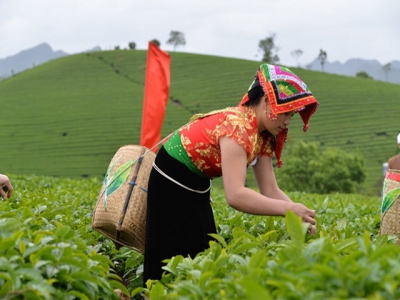Tea businesses need restructuring to add value

HÀ NỘI – The Government should build corporations with financial resources to help the domestic tea industry add value, branding and sales, said Chairman of Vietnam Tea Association Nguyễn Hữu Tài.
An ethnic minority woman harvests tea in the northern province of Thái Nguyên, which is a tea hub of Việt Nam. – VNA/VNS Photo
Tea is one of the agricultural commodities greatly affected by the COVID-19 pandemic. In the first five months of this year, tea exports reached about 46,000 tonnes, worth about US$72 million, down more than 10 per cent in value compared to the same period in 2019.
Tài said traditional markets of Việt Nam such as Taiwan (China), Pakistan and Russia were closed. In other markets, businesses could not sign new contracts, while previously signed contracts now would require deep discounts, delays to delivery times or had been cancelled.
“The global COVID-19 pandemic has put many domestic tea producers in a tough situation as they have to choose between restructuring or leaving the industry,” Tài said.
According to the prediction of the East Africa Tea Trade Association, world tea prices will fall in the near future, while restrictions on shipping of goods will reduce demand for tea in many countries. This will cause difficulties for the export of Vietnamese tea.
Long Đỉnh Joint Stock Company in the Tây Nguyên (Central Highland) province of Lâm Đồng has 50 hectares of high-quality tea certified for export. Each year, more than 90 per cent of the company's products are exported to Taiwan as raw materials at low prices.
Trần Phương Uyên, the company’s Deputy Director, told nhipcaudautu.vn that the company’s export volume of raw tea decreased by 30 per cent in March compared to previous months.
“To make a change, we are stepping up the restructuring of markets, targeting more premium products through the production of organic tea (True Organic) for domestic consumption,” Uyên said.
Uyên said her company was producing 10 hectares of True Organic with production certificate of the US Department of Agriculture. “However, with high cost, promoting organic tea consumption in the country is a big problem, for which Long Đỉnh has to find a solution.”
She said the company had so far sold three tonnes of finished organic tea. It currently suffers losses but still maintains its product prices so that consumers gradually get used to organic products.
About 90 per cent of domestic tea consumption comes from small establishments with unstable quality. Vietnamese tea businesses have created brands, such as Cozy, Phúc Long, Cầu Tre, Cầu Đất and Vinatea. Although there have been many more attractive product lines, Vietnamese tea businesses are still struggling to find ways to bring products to consumers.
Chairman Tài said the Government’s policies had only focused on tea production development rather than consumption, so many producers had sold raw tea to businesses, and were not interested in selling directly to customers.
“Meanwhile, it is not easy for Vietnamese businesses because the cost to open a tea distribution network is three times higher than that of a production factory,” Tài said.
Tea production in Việt Nam has returned to normal, so output will not be affected by the pandemic. The major tea exporting countries such as India, Kenya and Sri Lanka are still in the stage of disease control, so their harvesting and cultivation activities are restricted, affecting tea production.
Insiders have said that the coronavirus pandemic is an opportunity for many tea companies to change and improve product value instead of chasing output. Most Vietnamese tea has been exported as raw materials, which are then processed and packaged for consumption in the local market or exported to a third country. Vietnamese tea only accounts for about 5-20 per cent of the finished product value, while brands usually account for 40-60 per cent. This is why Viêt Nam is among the countries with the lowest tea export prices in the world.
Domestic enterprises need to focus on investment in improving quality, raising export prices, and especially increasing price for tea growers to help them improve living standards.
Có thể bạn quan tâm
 Kiên Giang develops rice co-operative – company links to ensure demand, supply
Kiên Giang develops rice co-operative – company links to ensure demand, supply Kiên Giang Province, the country’s largest rice producer, has taken measures to strengthen co-operation between co-operatives and companies involved in rice
 Production reform, awareness of EU regulation needed among agriculture businesses for EVFTA
Production reform, awareness of EU regulation needed among agriculture businesses for EVFTA With the EU-Việt Nam Free Trade Agreement (EVFTA) coming into effect in August and eliminating most tariffs, agriculture, forestry and aquaculture businesses
 Organic agriculture project adopted
Organic agriculture project adopted The percentage of organic livestock products is expected to reach about 1-2 per cent of the total domestic livestock products.